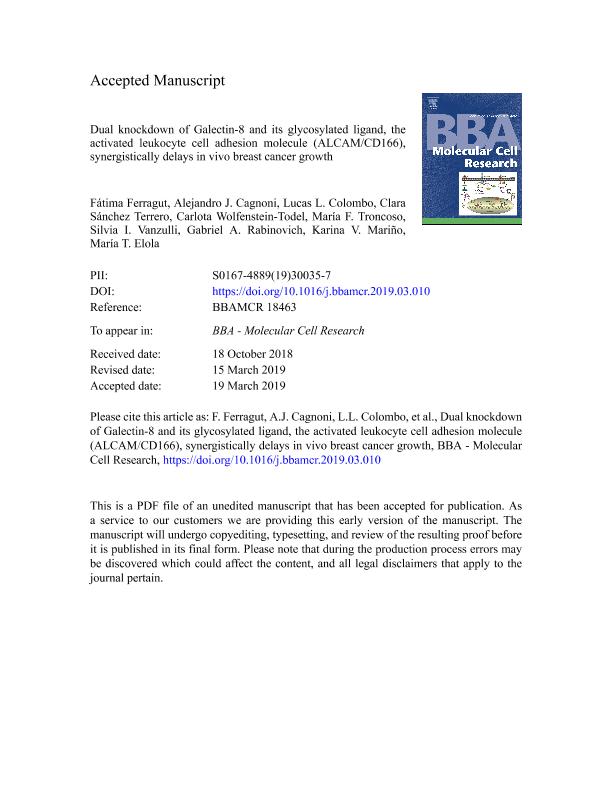Artículo
Dual knockdown of Galectin-8 and its glycosylated ligand, the activated leukocyte cell adhesion molecule (ALCAM/CD166), synergistically delays in vivo breast cancer growth
Ferragut, Fatima Eneida del Valle ; Cagnoni, Alejandro
; Cagnoni, Alejandro ; Colombo, Lucas Luis
; Colombo, Lucas Luis ; Sánchez Terrero, Clara; Wolfenstein Todel, Carlota; Troncoso, María Fernanda
; Sánchez Terrero, Clara; Wolfenstein Todel, Carlota; Troncoso, María Fernanda ; Vanzulli, Silvia; Rabinovich, Gabriel Adrián
; Vanzulli, Silvia; Rabinovich, Gabriel Adrián ; Mariño, Karina Valeria
; Mariño, Karina Valeria ; Elola, Maria Teresa
; Elola, Maria Teresa
 ; Cagnoni, Alejandro
; Cagnoni, Alejandro ; Colombo, Lucas Luis
; Colombo, Lucas Luis ; Sánchez Terrero, Clara; Wolfenstein Todel, Carlota; Troncoso, María Fernanda
; Sánchez Terrero, Clara; Wolfenstein Todel, Carlota; Troncoso, María Fernanda ; Vanzulli, Silvia; Rabinovich, Gabriel Adrián
; Vanzulli, Silvia; Rabinovich, Gabriel Adrián ; Mariño, Karina Valeria
; Mariño, Karina Valeria ; Elola, Maria Teresa
; Elola, Maria Teresa
Fecha de publicación:
21/03/2019
Editorial:
Elsevier Science
Revista:
Biochimica et Biophysica Acta-Molecular Cell Research
ISSN:
0167-4889
Idioma:
Inglés
Tipo de recurso:
Artículo publicado
Clasificación temática:
Resumen
Galectin-8 (Gal-8), a ‘tandem-repeat’-type galectin, has been described as a modulator of cellular functions including adhesion, spreading, growth arrest, apoptosis, pathogen recognition, autophagy, and immunomodulation. We have previously shown that activated leukocyte cell adhesion molecule (ALCAM), also known as CD166, serves as a receptor for endogenous Gal-8. ALCAM is a member of the immunoglobulin superfamily involved in cell-cell adhesion through homophilic (ALCAM-ALCAM) and heterophilic (i.e. ALCAM-CD6) interactions in different tissues. Here we investigated the physiologic relevance of ALCAM-Gal-8 association and glycosylation-dependent mechanisms governing these interactions. We found that silencing of ALCAM in MDA-MB-231 triple negative breast cancer cells decreases cell adhesion and migration onto Gal-8-coated surfaces in a glycan-dependent fashion. Remarkably, either Gal-8 or ALCAM silencing also disrupted cell-cell adhesion, and led to reduced tumor growth in a murine model of triple negative breast cancer. Moreover, structural characterization of endogenous ALCAM N-glycosylation showed abundant permissive structures for Gal-8 binding. Importantly, we also found that cell sialylation controls Gal-8-mediated cell adhesion. Altogether, these findings demonstrate a central role of either ALCAM or Gal-8 (or both) in controlling triple negative breast cancer.
Archivos asociados
Licencia
Identificadores
Colecciones
Articulos(IBYME)
Articulos de INST.DE BIOLOGIA Y MEDICINA EXPERIMENTAL (I)
Articulos de INST.DE BIOLOGIA Y MEDICINA EXPERIMENTAL (I)
Articulos(IQUIFIB)
Articulos de INST.DE QUIMICA Y FISICO-QUIMICA BIOLOGICAS "PROF. ALEJANDRO C. PALADINI"
Articulos de INST.DE QUIMICA Y FISICO-QUIMICA BIOLOGICAS "PROF. ALEJANDRO C. PALADINI"
Articulos(OCA HOUSSAY)
Articulos de OFICINA DE COORDINACION ADMINISTRATIVA HOUSSAY
Articulos de OFICINA DE COORDINACION ADMINISTRATIVA HOUSSAY
Citación
Ferragut, Fatima Eneida del Valle; Cagnoni, Alejandro; Colombo, Lucas Luis; Sánchez Terrero, Clara; Wolfenstein Todel, Carlota; et al.; Dual knockdown of Galectin-8 and its glycosylated ligand, the activated leukocyte cell adhesion molecule (ALCAM/CD166), synergistically delays in vivo breast cancer growth; Elsevier Science; Biochimica et Biophysica Acta-Molecular Cell Research; 1866; 8; 21-3-2019; 1338-1352
Compartir
Altmétricas



